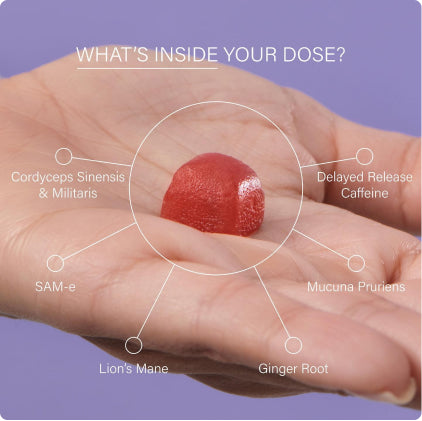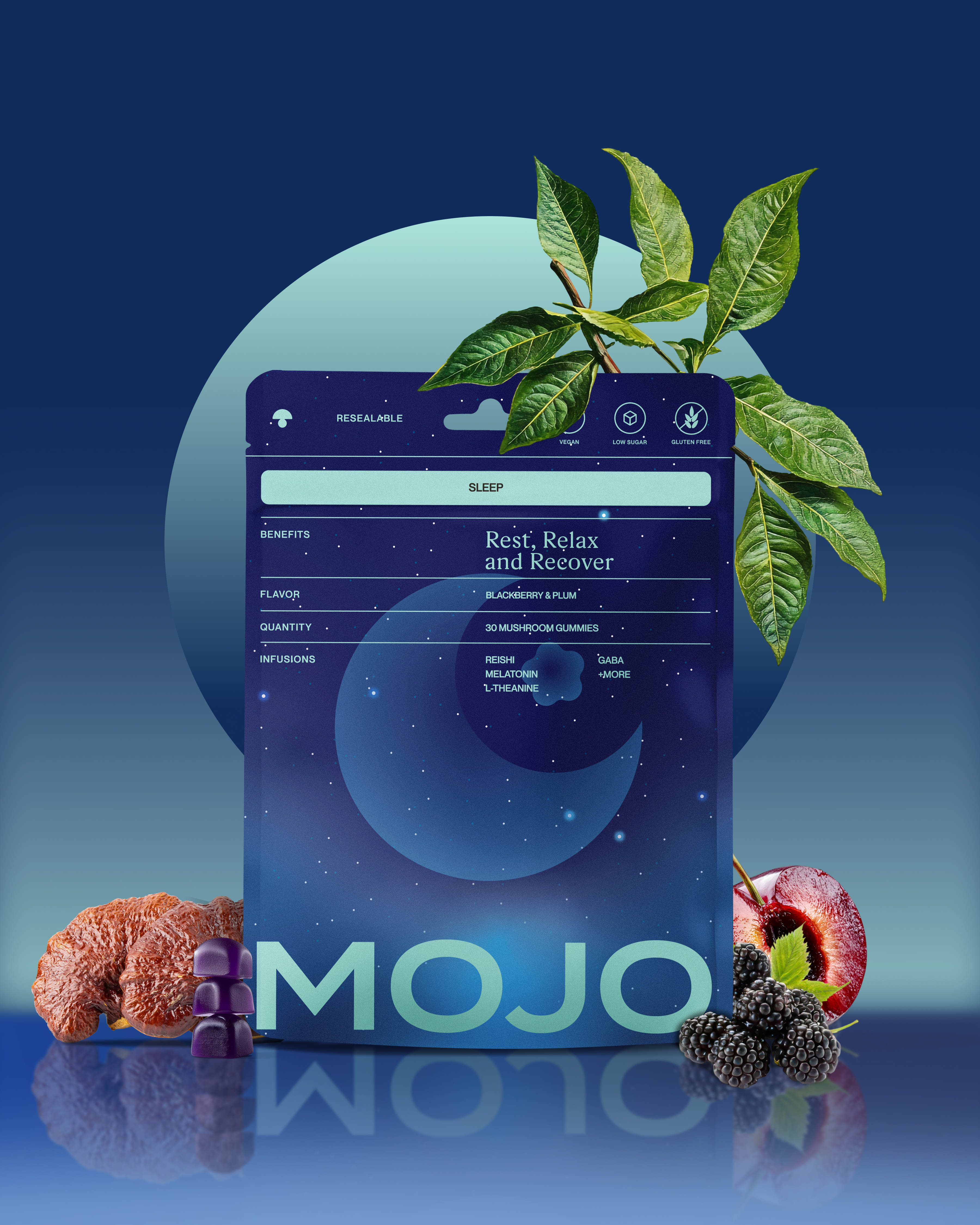Lion’s mane mushrooms are one of the superstars in the world of fungi. You’ll find them mentioned near the top of every medicinal mushroom list, and they’re hyped up as major components in the plethora of supplements on the market, claiming to boost brain function and support the immune system.
But what exactly are lion’s mane mushrooms, and does scientific research back up the bold claims of its vitality-boosting qualities?
What are lion’s mane mushrooms?
Hericium erinaceus, otherwise known as lion’s mane, is a type of tooth fungus. The name is an apt description, for this mushroom exhibits silky, ivory spines that dangle from hardwood trees across Asia, Europe, and North America. Its unique physical features have given rise to other common names such as the bearded tooth mushroom, hedgehog mushroom, or pom pom mushroom.
It remains unclear whether the fungus is saprophytic (meaning it feeds on decaying matter) or parasitic, as it is also found on living trees. Regardless of its feeding mechanism, it is estimated that lion’s mane can survive for forty years. Their fruiting bodies have even been observed to appear intermittently for twenty years on the same dead tree.
Since it has no cap, lion’s mane spores are released instead by its spindly teeth. It is one of the most recognizable tooth fungus varieties and is easily identifiable despite being somewhat of a rare sight in the wild.
Traditional Chinese medicine has extolled the virtues of lion’s mane mushrooms for centuries. Some commonly claimed benefits include immune system support, mood enhancement, cognitive improvement, and providing a general boost to Qi – the life force that regulates energy and vitality.
Health benefits of lion’s mane mushroom
A lot of fungi-related scientific research has focused on lion’s mane. The studies continue to back up the historical and anecdotal claims of lion’s mane’s powerful health benefits, although more human trials are needed.
Many of the benefits seem to be related to the abundance of bioactive compounds like beta-glucan polysaccharides found in many mushroom species. In terms of Hericium erinaceus, over fifty such bioactive compounds are present.
Here are some of the promising health benefits supported by lab-based research.
Improves brain health
Lion’s mane has earned a reputation for enhancing cognitive function and protecting the brain from the effects of aging. Studies have discovered that the mushroom contains two important neurotrophic compounds, hericenones and erinacines, which stimulate brain cell growth, and the reason for it’s naming.
Research conducted on mice demonstrates that lion’s mane mushroom may potentially prevent or treat dementia. There is even further evidence in animal trials for the mushroom’s positive action in treating Alzheimer’s, Parkinson’s, and other neurodegenerative diseases.
In humans, at least one study points to increased cognitive function due to the consumption of lion’s mane. Older adults who took 3g of powdered lion’s mane a day saw significant improvement on cognitive assessments. However, the effects only lasted as long as they took the supplements. Nevertheless, this study found that lion’s mane has valuable potential in treating mild cognitive impairment.
Lifts mood
Traditional Chinese medicine practitioners have historically prescribed lion’s mane for mood enhancement and the treatment of depression and anxiety. It is thought that the mushroom’s anti-inflammatory and neuroregenerative properties can stabilize the brain and body to nurture a calming sense of balance.
Current research conducted on mice seems to back up these claims. Researchers extracted amycenone from lion’s mane and administered it to mice with symptoms of depression. They found that it induced significant antidepressant and anti-inflammatory responses.
Another study gave cookies containing lion’s mane mushroom powder to menopausal women for one month. The women reported lowered levels of irritation and anxiety and experienced higher-quality sleep than the placebo group. (This might have just been from eating cookies for a month ;) but the data puts the ball on the side for Lion’s Mane)
Helps repair the nervous system
The nervous system communicates signals between the brain and body to control all our bodily functions. Therefore, any damage to this system can have a severely negative impact on our health.
Research shows that lion’s mane demonstrates promise for repairing damaged nerve cells in animal studies. Brain, spinal cord, and retina cells have all demonstrated stimulated growth responses to lion’s mane. Additionally, in rodent studies, extracts from the mushroom sped up recovery times for rats with damaged nerves.
Supports digestive health
The anti-inflammatory properties of lion’s mane can positively affect gut health, potentially providing relief to people suffering from stomach ulcers or irritable bowel syndrome (IBS).
One study observed the antibacterial effects of lion’s mane against H. pylori bacteria. This corroborates traditional claims that the mushroom is helpful in the treatment of gastric ulcers.
Lowers risk of heart disease
Lion’s mane has the potential to reduce several risks associated with heart disease. For example, a study on rats demonstrated “a potent cholesterol-lowering activity” following the administration of lion’s mane extract to rats with a high-fat diet.
Furthermore, lion’s mane contains the compound hericenone B, which is known to reduce blood clotting. This lowers your risk of suffering from a heart attack or stroke.
Treats symptoms of diabetes
Regulation of blood sugar levels is key to managing diabetes. Over time, high blood sugar can result in kidney damage and deterioration of nerve cells.
In a study conducted to determine the effects of lion’s mane extract on diabetic rats, a month-long trial resulted in significant decreases in blood sugar levels and a substantial increase in insulin production. While more studies are needed to prove conclusive for humans, it shows promise for further research.
Boosts immunity
The lion’s mane mushroom is historically prized for its immune-supporting functions. Recent research seems to back this up, finding that lion’s mane extracts can help regulate healthy gut bacteria and support the digestive system’s immunological response.
Another promising study showed that mice lived almost four times as long as the control group when given lion’s mane extracts after receiving lethal doses of salmonella bacteria.
Side effects
Most of the current research is based on animal studies. Nonetheless, there is a lack of evidence to suggest any significant side effects of consuming lion’s mane, except in some instances where a person is allergic. Furthermore, the long history of Hericium erinaceus being used in traditional medicine shows that humans tolerate the continued consumption of lion’s mane.
While you should consult your doctor before using the mushroom to treat any severe medical conditions, it appears that lion’s mane may be safe to take regularly and at relatively high doses.
How do you prepare lion’s mane mushrooms?
Even if you disregard the health benefits to the immune system, lion’s mane still possesses unique culinary value. Many circles consider it a gourmet mushroom, with a flavor reminiscent of lobster or other seafood. Furthermore, the spines give it a delightfully spongy, chewy texture.
Due to its high water content, you shouldn’t rush the cooking process, or you’ll end up with a tough ball of quills. Likewise, do not eat mushrooms raw. Since they contain a high amount of hard-to-digest chitin, your body won’t be able to access the beneficial compounds found behind the rigid cell walls.
Chinese recipes often call for boiling the mushroom at length in soups or hot pot. You can also pan-fry lion’s mane with the lid on to steam it for a while. Then, when it has released most of its water content, sautee it until browned with butter and other aromatics over medium-high heat.
If you'd like to experience the benefits of lion's mane while enjoying a cup of tea instead, steep the fresh or dried mushrooms in hot water. It a while to extract the nutrients from the mushrooms, so steep it longer than you would normal tea. Many recipes suggest simmering the mushrooms for around twenty minutes to release the most amount of nutrients.
How do you take lion's mane extract?
If you want to try lion's mane for yourself, it's best to source a high-quality supplement from a reputable manufacturer. Take time to research the company and make sure they're including high amounts of extract in their supplements.
Lions mane is a key ingredient in our Microdose gummy product Mojo. We chose it preciously because of it's brain health, antioxidant, calming and mood modulating properties.

Many companies will grind up the fruiting bodies and raw substrate material altogether. This produces a large amount of material that is technically lion's mane mushroom but doesn't have enough concentrated bio-active ingredients to benefit your health. Sometimes, other bulking agents such as flour or rice will be incorporated. So don't just settle for the first supplement you come across at the grocery store, be sure to find a trustworthy supplier.
Lion's mane extract can also come in powdered form, which can be easily added to teas, smoothies, or baked goods.
Final thoughts
Aside from being a beautiful species of fungi, Hericium erinaceus has many medicinal and culinary uses. Scientific research is still ongoing, but the results are promising, and it seems to validate many of the anecdotal claims. The most encouraging avenue of research appears to be related to improved cognitive function and its ability to stimulate nerve growth.
However, nothing is more rewarding than finding this mushroom species on your own in the wild. They’re primarily seen in humid, temperate climates and are likely to be found on higher sections of trees than other mushrooms. So next time you go out foraging for mushrooms, keep your eyes peeled. The clustered ball of white spines dangling from a tree trunk is quite a sight to behold.
They're also really delicious to eat, known as the lobster of mushrooms.
Table of contents









